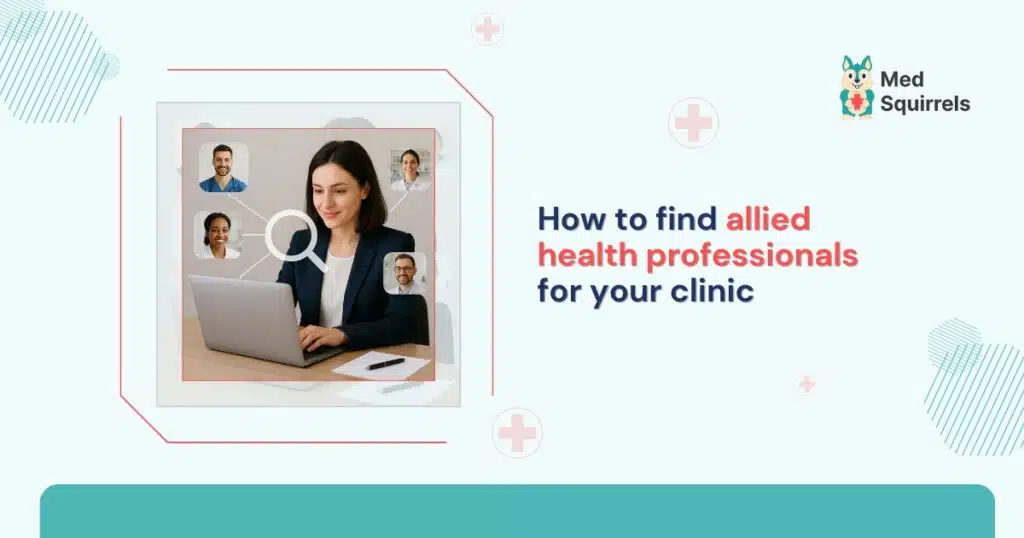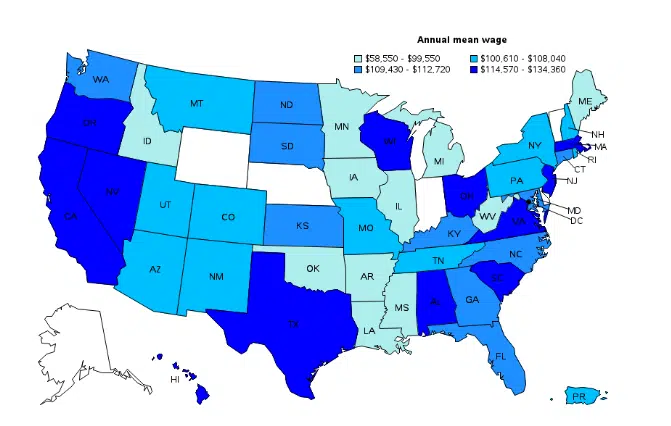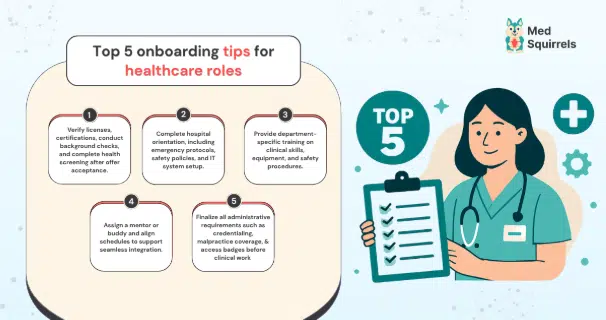How to find allied health professionals for your clinic

Today, the challenge of how to hire allied health professionals is more urgent than ever. Clinics are busier, and patient demands are more complex. Allied health professionals, including radiologic technologists, lab technicians, physical therapists, and medical assistants, play a vital role in clinical care and operations.
As the importance of these roles grows, many clinics are struggling with staffing shortages. These gaps impact patient services and reduce team efficiency. Finding skilled allied health professionals is no longer a routine HR task; it requires a strategic plan tailored to today’s fast-moving healthcare environment. The process begins with understanding your clinic’s needs and building an approach to attract and retain the right people. Without the right workforce in place, clinics risk delays, increased costs, and lower satisfaction among patients and teams alike.
Barriers that make allied staffing difficult
Hiring experienced allied health professionals presents real challenges. Demand is high, creating a limited talent pool and driving fierce competition to hire allied health professionals. Clinics also face delays with credentialing and licensing, which can slow down onboarding and service delivery.
Turnover is another issue. High caseloads and few growth opportunities often lead to burnout. Retaining staff becomes just as important as hiring them. Time and budget limitations can make the process even more complicated for in-house hiring teams, especially when clinical coverage must be maintained during vacancies.
- Credentialing and onboarding delays push back start dates.
- Competitive markets lead to increased salaries and staff poaching.
- Poor onboarding can lead to early resignations
- Rising salary expectations strain limited clinic budgets
When these issues are not addressed early, the hiring cycle becomes longer and more costly. Taking a proactive approach to hiring allied health care professionals allows clinics to overcome these challenges and build a stronger workforce that delivers consistent, high-quality patient care
While hiring, healthcare facilities must also be aware of recent salary trends to remain competitive in today’s talent market, for example, roles like psychologists have seen noticeable changes in pay expectations. An infographic has been added below for a better understanding of current trends across key allied health professions.
Annual wages of psychologists by state in the USA

Source: www.bls.gov
Sourcing strategies to find allied health talent
To fill positions faster, clinics need innovative sourcing methods. One of the most effective ways is to work with staffing agencies that specialize in allied health staffing solutions. These partners often have access to pre-screened, qualified candidates and can fill openings more quickly, especially for time-sensitive clinical needs or temporary gaps.
In addition to staffing partnerships, clinics should expand their outreach using other targeted channels. Healthcare job boards, partnerships with allied health college programs, and hiring events are great ways to connect with both new graduates and experienced professionals. Outreach efforts should reflect your clinic’s values and growth opportunities to help attract top-tier candidates.
- Connect with allied health schools to find new talent.
- Use referral programs to reach candidates who match your culture.
- Join healthcare associations to meet qualified professionals.
By using these strategies, your clinic can compete more effectively in the market for how to hire allied health professionals and improve both the quality and speed of your hiring process.
Also read: 5 strategies to attract top allied healthcare talent.
What to expect from a staffing partner?
Understanding how to hire allied health professionals starts with choosing the right staffing partner. Not every agency is equipped to support your needs. Look for one with a strong background in allied staffing solutions and a clear understanding of how clinics operate. A reliable partner will offer hiring options for temp, contract, or full-time roles, helping you adapt to shifting demands without interrupting patient care.
They should also handle compliance, background checks, and onboarding, so your hires are ready to start on day one. Vetting is critical, and a reliable partner will give you precise performance data. Communication and transparency also matter; your partner should keep you informed, listen to your needs, and provide ongoing support.
- Choose an agency with national reach and local support.
- Confirm they manage all required compliance steps.
- Ask about success metrics like fill rate and retention.
The right staffing partner can strengthen your process for hiring allied health professionals and support your long-term hiring goals. Over time, this relationship can reduce strain on internal teams and help clinics respond more efficiently to changing care demands.
Also read: Why should you hire an agency to fill allied healthcare staffing gaps?
Strategies for hiring allied health professionals
Once your team is in place, the next focus is retention. Onboarding, communication, and setting clear expectations help create a positive experience from the start. Staff who feel supported are more likely to stay, which in turn reduces costs and improves care. It is essential to treat retention as a continuous process that includes recognition, feedback, and access to resources that support growth. To make onboarding more effective, helpful tips are available; an infographic has been added below to guide you through these essential practices.

Offering professional development can also improve retention. Continuing education, certification support, and growth opportunities keep your team motivated. Creating a workplace that values collaboration and balance encourages long-term commitment. A well-supported team is more productive, stays longer, and contributes to better patient care.
Focusing on structured onboarding plans, check-ins, and creating internal career pathways will further strengthen your approach to hiring allied health professionals. These strategies not only support long-term retention but also elevate your efforts in allied health recruitment and expand the impact of your allied health staffing solutions.
Why partnering wisely makes all the difference
Healthcare facilities and recruiters looking to hire allied health professionals often begin their search using multiple free platforms, from general job boards to professional networks. When that does not yield the right match, the next logical step is to partner with staffing providers. However, many end up working with traditional staffing agencies, which can introduce significant drawbacks:
- They typically charge high mark‑ups, inflating overall hiring costs.
- They provide limited transparency on clinician pay and billing structure.
- They often lock facilities into rigid contracts with little flexibility or visibility.
To overcome these issues, health facilities should thoroughly research and select modern staffing platforms that prioritize affordability, transparency, and efficiency.
MedSquirrels offers a more modern and efficient approach to allied health staffing solutions by removing unnecessary agency overhead, improving hiring clarity, and ensuring that most of the billing amount reaches the healthcare professionals. It is suitable for healthcare clinics and facilities of all sizes, thanks to its affordable hiring plans designed to fit a range of staffing needs.
The Purple Plan helps clinics that have chosen candidates internally but require help with onboarding, credentialing, payroll, and benefits. The Orange Plan provides a complete solution, covering everything from sourcing and recruitment to payroll, onboarding, compliance, and long-term workforce management. The Blue Plan supports facilities that have already identified clinicians and only need hiring and recruitment support. These plans come with flat-rate pricing, no hidden fees, and transparent clinician pay, ensuring that hiring remains cost-effective and sustainable.
Facilities also benefit from a smoother and faster hiring process with built-in onboarding and credentialing tools that reduce delays and errors. Transparent pay structures allow clinicians to see what they earn, which builds trust and improves retention. With access to a strong network of qualified and pre-vetted allied professionals, such as radiologic technologists, physical therapists, lab technicians, and more, facilities can hire with confidence and without the limitations imposed by traditional staffing agencies. For those who want to know more about how the platform fits their workflow, MedSquirrels even offers a free demo, making it easy to explore how their process works before committing.
FAQs
Why is it challenging to hire allied health professionals today?
There are multiple reasons, and one main reason is high demand and a limited talent pool, leading to competition among healthcare facilities. Many professionals are also burned out, making it harder to retain them even after hiring.
What should clinics focus on when recruiting allied healthcare professionals?
While hiring allied healthcare professionals, clinics should prioritize quick credentialing, verifying certifications, and selecting professionals who align with the clinic’s culture. Partnering with platforms that already vet candidates can speed up the process.
Should salary trends be considered before hiring?
Yes, being informed about current salary expectations for roles like radiology techs or psychologists helps offer competitive packages. It also prevents delays due to negotiation mismatches.
What types of allied health roles does MedSquirrels help fill?
MedSquirrels supports a broad range of roles, such as physical therapists, radiologic technologists, medical assistants, lab technicians, and psychologists. Its network includes both experienced professionals and new graduates.
Does MedSquirrels support facilities of all sizes?
Yes, MedSquirrels is built to assist clinics, hospitals, and specialty practices of any size. Whether you are a small practice or a multi-location group, the platform has suitable hiring options.
Suresh writes about healthcare staffing and industry insights for MedSquirrels, helping professionals and facilities navigate hiring needs.
